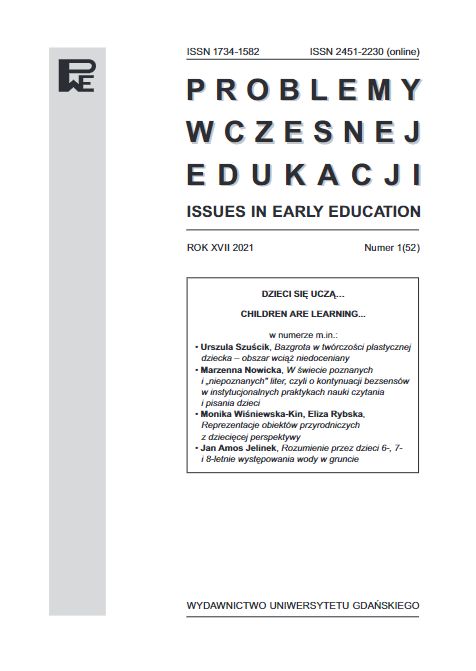Children’s perception of the Human Zoo
DOI:
https://doi.org/10.26881/pwe.2021.52.06Keywords:
human zoo, collecting, children, emotivism, commodification of gaze, postcolonialismAbstract
The presented article explores the idea of the Human Zoo and the children’s perception of the possibility of keeping people in the Zoo. From the point of view of analytical practice, the collected statements of children were examined by means of a critical discourse analysis understood by Fairclough as textual and linguistic social practices reflecting the symbolic structure. The children’s statements show unequivocal resistance to the vision of exposure of the human body and strong species identification. The images of the Human Zoo make it possible to see the orientation to the perception of the species relationship in the normative dimension. This orientation takes place on an emotional level, confirming research in the field of moral development and the concept of emotivism. The reversal of order, in turn, shows the social order as a brutal genre struggle, activating the imaginary of nature perceived as threatening and dangerous.
Downloads
References
Bednarek J. (2012), Praca biopolityczna i nowy skład klasowy. „Praktyka Teoretyczna”, 5.
Bee H. (2004), Psychologia rozwoju człowieka. Poznań, Zysk i S-ka. Benjamin W. (2005), Pasaże. Kraków, Wydawnictwo Literackie.
Corbey R. (1993), Ethnographic showcases, 1870–1930. „Cultural Anthropology”, 8(3).
Earle T.F., Lowe K.J.P (eds.) (2005), Black Africans in Renaissance Europe. Cambridge, Cambridge University Press.
Elsner J., Cardinal R. (eds.) (1994), The Culture of Collecting. London, Reaction Books.
Fairclough N. (2001), Language and power. Edinburgh, Longman.
Hardt M., Negri A. (2012), Rzecz-pospolita. Poza własność prywatną i dobro publiczne. Kraków, Korporacja Ha!art.
Jabłońska B. (2013), Krytyczna analiza dyskursu w świetle założeń socjologii fenomenologicznej (dylematy teoretyczno-metodologiczne). „Przegląd Socjologii Jakościowej”, 9(1).
Jahoda G. (2007), A History of Social Psychology. From Eighteenth-Century Enlightenment to the second World War. Cambridge, Cambridge University Press.
Jaques T.C. (1997), From Savages and Barbarians to Primitives: Africa, Social Typologies and History in Eighteenth-Century French Philosophy. „History and Theory”, 36(2).
Kafka F. (2013), Przemiana. Białobrzegi, Masterlab. Kieniewicz J. (2003), Wprowadzenie do historii cywilizacji Wschodu i Zachodu. Warszawa, Dialog.
Kwieciński Z. (2004), Pedagogiczne zero: zastosowania problemowe, epistemiczne i magiczne. „Nauka”, 2. Lazari-Pawłowska I. (1980), Kręgi ludzkiej wspólnoty. „Etyka”, 18.
Pawlik J.J. (2008), Egzotyzm – wątpliwy zachwyt odmiennością. W: P.A. Sokołowski (red.), Misje w XIX wieku. Pieniężno, Misyjne Seminarium Duchowne Księży Werbistów.
Pomian K. (2001), Zbieracze i osobliwości. Paryż–Wenecja, XVI–XVIII wiek. Lublin, Uniwersytet Marii Curie-Skłodowskiej.
Schreiber H. (2012), Koncepcja „sztuki prymitywnej”. Warszawa, Wydawnictwa Uniwersytetu Warszawskiego.
Szkudlarek T. (1997), Poststrukturalizm a metodologia pedagogiki. „Acta Universitatis Nicolai Copernici”, 13.
Wojciszke B., Baryła W. (2000), Potoczne rozumienie moralności: pięć kodów etycznych i narzędzie ich pomiaru. „Przegląd Psychologiczny”, 43(4).

 Academic Scientific Journals
Academic Scientific Journals





